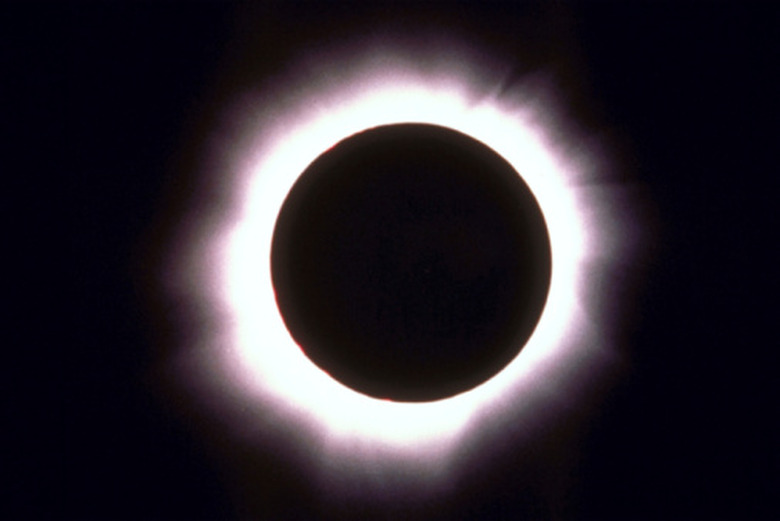What Are The Causes Of Lunar And Solar Eclipses?
For thousands of years, solar and lunar eclipses have captivated humans. Different cultures around the world have sought to understand the celestial events occurring in the sky through the creation of stories and rituals. Today, scientists have a stronger grasp on the astronomical factors that cause eclipses. Solar and lunar eclipses occur because of the changing positions of the earth, sun and moon in relationship to one another.
Ancient Beliefs
Ancient Beliefs
Ancient cultures held different beliefs about the causes of solar and lunar eclipses. For many, eclipses were fearful celestial occurrences that carried portents of evil. The ancient Chinese believed that a dragon devoured the sun during a solar eclipse. Similar beliefs of monsters swallowing the sun existed among African, Asia, European and Native American peoples. In attempts to scare away the dragon or monster, ancient peoples would gather together to shout or bang on instruments to create loud, booming noises. Among the ancient Greeks, Chinese, Mayan and Arabic peoples, legends linked lunar eclipses to earthquakes, plagues and other catastrophes.
Solar Eclipses
Solar Eclipses
A solar eclipse occurs when the moon, the sun and the earth are aligned during a new moon phase. The moon passes between the earth and the sun, which causes the moon to completely or partially cover the sun. In a total solar eclipse, the moon completely covers the bright surface of the sun, leaving the corona, or the sun's outer white area, visible to the naked eye. Annular solar eclipses occur when the moon appears smaller than the sun and thus fails to cover the entire solar disk. This eclipse causes a bright ring of the sun to remain visible around the moon. The varying distances of the moon from the earth cause different types of solar eclipses. When the moon is closer to the earth, it has a greater chance of fully covering the sun than when it is farther away.
Lunar Eclipses
Lunar Eclipses
A lunar eclipse occurs when the earth passes between the sun and the moon during a full moon phase. The moon enters the earth's shadow, which consists of two parts: the umbra, or inner, dark shadow, and the penumbra, or the outer, hazy shadow. Some sunlight makes it around the earth, and our atmosphere bends, or refracts, the light. This refraction of light gives the surface of the moon a reddish or coppery tint. Total lunar eclipses occur when the moon completely enters the earth's umbra, while partial lunar eclipses refer to when the moon partially enters the earth's umbra. A penumbral lunar eclipse occurs when the moon enters only the earth's penumbra.
Frequency
Frequency
The moon's orbit is inclined, or at an angle, to that of the earth, so the moon rarely is aligned, with the sun and the earth. Often the moon appears above or below the sun in the sky during the new moon or bypasses the earth's shadow on full moons. On rare occasions, however, the moon aligns with the earth and the sun during a new- or full-moon phase, to create solar or lunar eclipses. According to "The Cambridge Eclipse Photography Guide: How and Where to Observe and Photograph Solar and Lunar Eclipses," by Jay M. Pasachoff and Michael A. Covington, if you combine the different types of solar and lunar eclipses, about seven eclipses are visible in different locations around the world in a given year. However, total solar eclipses generally occur about every 18 months.
References
- "The Cambridge Eclipse Photography Guide: How and Where to Observe and Photograph Solar and Lunar Eclipses"; Jay M. Pasachoff, et al.; 1993
- "Eclipse! The What, Where, When, Why, and How Guide to Watching Solar and Lunar Eclipses"; Philip S. Harrington; 1997
Cite This Article
MLA
Drake, Julia. "What Are The Causes Of Lunar And Solar Eclipses?" sciencing.com, https://www.sciencing.com/causes-lunar-solar-eclipses-8451999/. 24 April 2017.
APA
Drake, Julia. (2017, April 24). What Are The Causes Of Lunar And Solar Eclipses?. sciencing.com. Retrieved from https://www.sciencing.com/causes-lunar-solar-eclipses-8451999/
Chicago
Drake, Julia. What Are The Causes Of Lunar And Solar Eclipses? last modified March 24, 2022. https://www.sciencing.com/causes-lunar-solar-eclipses-8451999/
